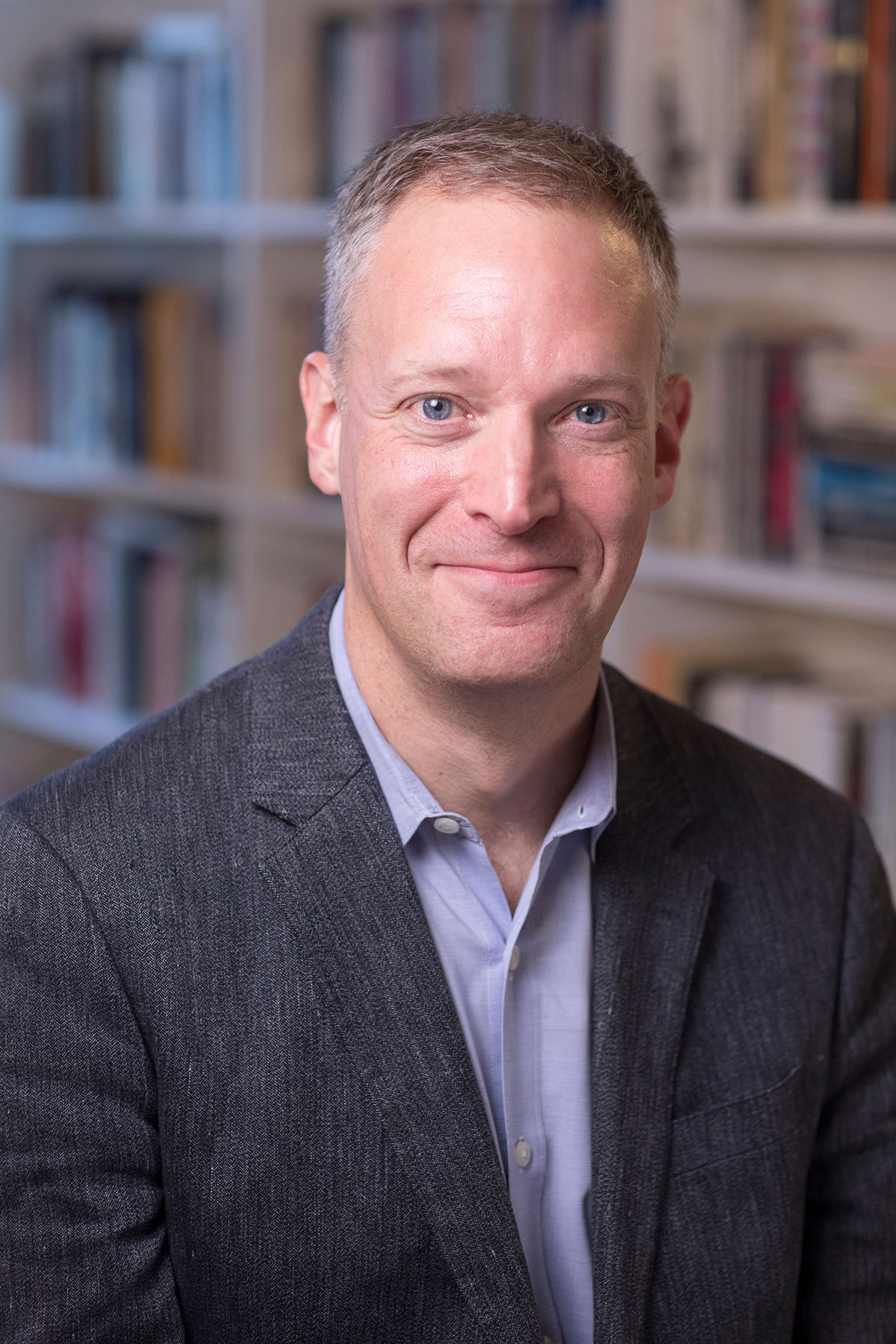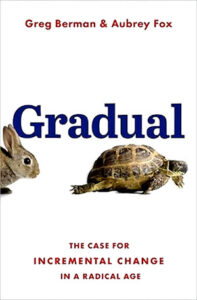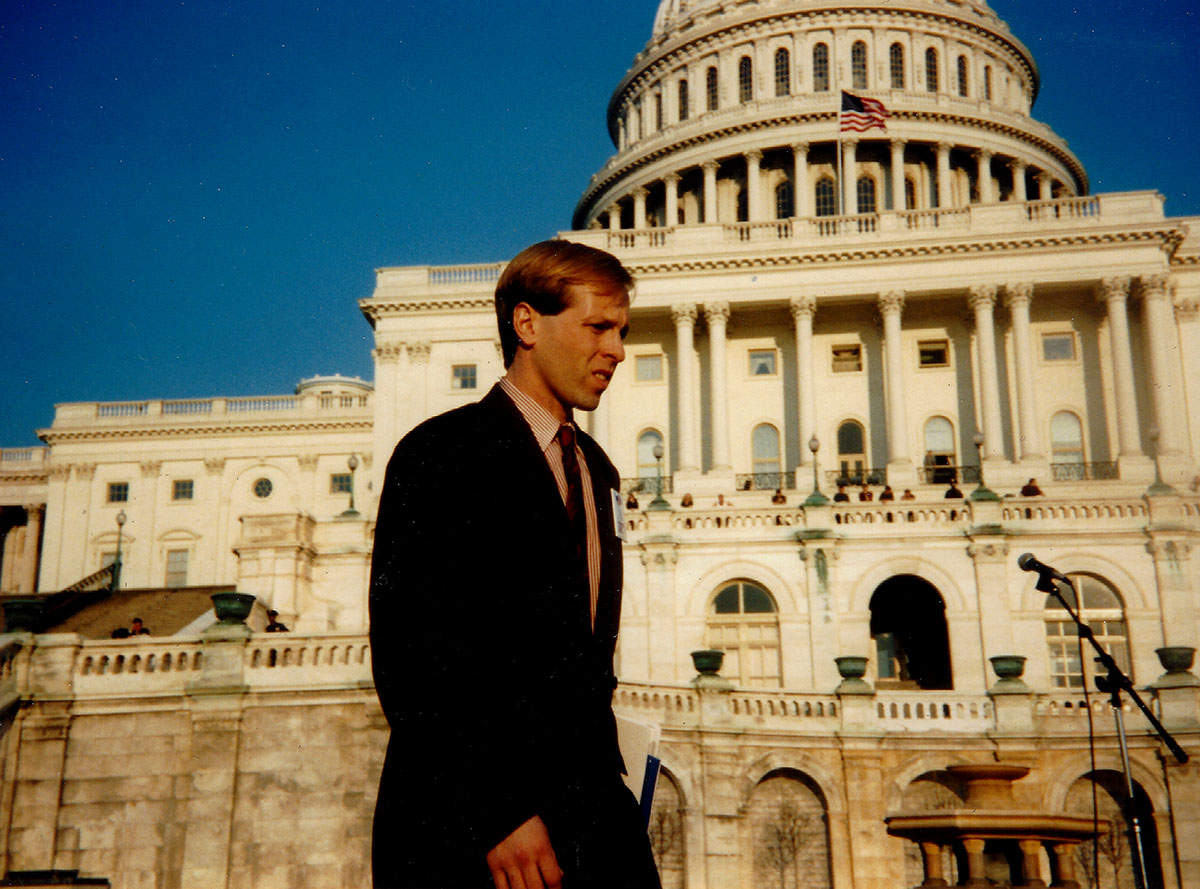Taking Things Slow: A Q&A with Author Greg Berman ’89, P’21, ’24

Greg Berman ’89, P’21, ’24, is distinguished fellow of the practice at the Harry Frank Guggenheim Foundation and co-editor of the urban policy journal, Vital City. He was part of the founding team that created the Center for Court Innovation (now called the Center for Justice Innovation) and he served as its director from 2002 to 2020. In Gradual: The Case for Incremental Change in a Radical Age (Oxford University Press, 2023), Berman and co-author Aubrey Fox argue in support of gradualism—the act of effecting social change through small, deliberate actions that accumulate to large scale changes over time. He spoke with Wesleyan Magazine about his latest book, his career in nonprofits, and the culture of student activism at Wesleyan.
Your book argues that our country’s legislative checks and balances system is working exactly the way the Founding Fathers intended by permitting gradual change instead of radical revolution. If the system isn’t broken, why write this book?
Greg Berman: We wrote the book during the COVID pandemic, when it felt like the center was not holding. You had these calls for radical change coming from mainstream figures like Chuck Schumer and Bernie Sanders. You see the same thing happening now in the Republican Presidential primary. To be clear, we do have serious problems in this country. The book is not a call for more of the status quo. The book is a call for ceaseless, unrelenting efforts to try to improve our society. But the kind of changes that we want to achieve in the world—eliminating racism, inequality, hunger, etc.—are not easy. People have been trying to do these things for hundreds of years. So, the likelihood that we’re going to achieve these goals in the next few months is basically nil. That’s the bad news.
Is there any good news?
GB: The good news is that government can make a positive difference in people’s lives. Lots of people don’t believe that, but I saw it every day through my work at the Center for Court Innovation. It’s just that the kind of change the government is best at delivering tends to be relatively modest. In the book, we cite criminologist Joan Petersilia saying that the best outcome a well-funded, well-run criminal justice reform program can achieve is a 10 to 20% reduction in recidivism. That feels kind of insubstantial to a lot of people. But if you achieve a 10% reduction in recidivism, and you stack that up year after year after year, you will, in fact, achieve something really significant. You will have transformed the city. You will have transformed the lives of hundreds of thousands of people. You will have reduced incarceration significantly. So small things make a difference. They add up over time, and we should celebrate small wins wherever we can find them.
GB: To be honest, I emerged from writing the book feeling much more positively about American government than I did going in. The stuff that makes the papers on a day-to-day basis tends to be stories of dysfunction and gridlock. But as we document in the book, underneath the headlines, Congress is working pretty much as it always has, and bipartisanship is, in fact, alive, although perhaps not as well as we might hope. You just don’t read about it all the time. For example, Congress recently passed the first gun safety legislation in a generation on a bipartisan basis.
You’ve spent most of your career working in the nonprofit sector focused on criminal justice reform. What drew you to that field?
GB: When I graduated from Wesleyan, I knew that I wanted to work in the public interest. The first stage of my career was spent searching for the issue that I’d be most passionate about. In my mid- to late-20s, I made a very conscious switch in my thinking that turned out to be a game changer for me. I went from being focused on “what was the topic that I was going to be working on? What was the subject matter?” And I started asking “Who am I going to be working with?” And that was a crucial difference, because it turned out what was most important to me was being surrounded by smart, hardworking, decent people. So I deliberately sought out environments, regardless of what the subject matter was, that met that criteria.
But specifically, the thing that got me into criminal justice was meeting John Feinblatt ’73, who was a Wesleyan alum. He was starting to plan an experimental courthouse in midtown Manhattan called the Midtown Community Court. This was in the early 1990s. I did an internship with him, and that turned into a job, and then I helped him create the Center for Court Innovation.
The book cautions readers not to heed the siren song of radicalism, but there is a growing sense of frustration among many Americans because problems in our world—from climate change to racial equity—are not being solved fast enough. Do you have any advice for those who might be feeling disheartened by the reality of these slow changes?
GB: I guess the advice is to get used to the idea that it’s a marathon and not a sprint.
Wesleyan University has a reputation among higher ed liberal arts institutions for its culture of student activism. Did you participate in activism during your time at Wesleyan?
GB: No, I wasn’t active in protest while I was at Wesleyan, but the message Wesleyan sent to me as a student was, “You should be engaged with the world outside of the ivory tower.” Not every college communicates that. I’m incredibly grateful for Wesleyan in that regard because it really did encourage me and my classmates to not be navel gazing, but to think about how things were going in the world. I’ve tried to carry that forward in my career.
College campuses are often incubators for radical activism. Do you think these institutions have an obligation to educate young people on the reality of our democratic system?
GB: I get concerned when we impart to young people that the only way to make change is through activism. Activism for sure has a role to play in our society. There are many positive things in the world that I can point to that activists have accomplished. But that’s just one path towards making a difference.
It’s incumbent on universities like Wesleyan to temper idealism. We need idealism, but it has to be tempered with an acknowledgment of just how difficult these problems are, and just how complicated our heterogeneous American society is. A lot of student activists flame out. They come out of school raring to go, full of passion, and then just drift away because they had unrealistic or naive notions about what kind of impact they would have in the world.
Gradual is a call for slow, incremental change toward a safer more equitable world. How do we begin?
GB: I don’t think there’s just one answer. But I believe that to truly practice democracy also means practicing pluralism, tolerance, and humility. Those are the themes of the book. I think a belief in incrementalism is less about how you should vote on any particular issue and more about how you should approach the world. If we all manifested these kinds of qualities, we would make the world a better place.


